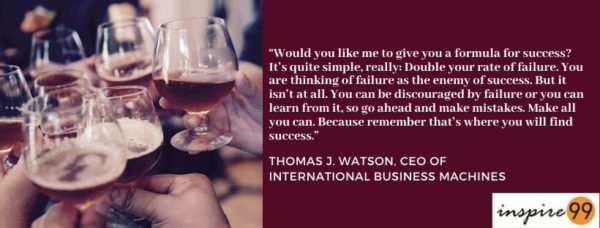The formula for success in a startup: Discussion about achieving success in a startup. Naturally in this post, we don’t have a magical answer which ensures you 100% but an analysis of the inspirational quote from Thomas Watson about doubling your rate of failure. We will touch upon key points such as taking feedback, working at speed and not waiting for perfection while developing your startup. It might not sound like the perfect plan, but as a startup, you want something that works rather than a perfect plan!
In this article, we will talk about agile processes to build your startup iteratively. The most important formula for success in a startup is by ensuring that you’re improving your product/service consistently to provide great value to your customers. Instead of waiting for the perfect product, you will be able to eliminate waste by ensuring that you have a product in continual development and yet listening to the customer’s needs consistently.
Formula for success in a startup
Being a huge fan of leadership content and books, podcasts, etc out there – I must admit, I am a bit fed up with the self-professed gurus who quote the formula for success in a startup. In general, I would be wary of articles that quote – X steps to ensure that you will achieve success in life or Y things which all successful people do.
There simply is no simple, easy trick. However, there are a few strategies you must follow to ensure that you maximise your chances of success. Success never is a single outcome, but a constant journey moving from one result to another. If you’re afraid of failure, then it is the first thing you’ll need to get over while developing your startup.

The only point I’d like to impress is to develop a process for a feedback loop to continually develop the product or service. Build this in your culture and accelerate the speed to market. It helps you to eliminate waste and gives you the best chances of success as a startup.
In this quote analysis, we will talk through the factors of Formula for success in an agile environment, the value of failures and quick decision making and ultimately the importance of a constant feedback loop to learn from every single experience – to aid and benefit our quest.
1. Defining success for your startup in an agile environment
What is the formula for success?
Get up early, slog through ungodly hours only to realise that you have been barking up the wrong tree?
Or
Does it mean that we need to assume that we are very smart and we will get it right every single time, no matter what the conquest is?
It is awful to read so many articles which make success and failure personal and advocate that they define your quality as a personality. At best, these are singular events that tie together for a longer goal.
For instance, a startup is not just about fundraising. Granted that fundraising is a huge success, it is simply a means to achieve a longer-term goal that defines success as a whole. We can’t afford to keep worrying about the small things – some failures or setbacks are absolutely necessary to set us in the right direction. If we are clear about what we want and make sure to use each one of our experiences in the right direction, we can get to our result quicker.
2. Doubling your Rate of Failure
I like the concept of doubling the rate of failure figuratively. I am sure no one wants to be doubling their rate of failure on purpose. But, having said that, we can’t spend an eternity being afraid of failures.
If you are thinking of a product release, some people will like your features and some others will hate it in a very staunch manner. What do you do? Not release at all for the fear the someone might rebuke or feel unhappy?
As a startup, we are always forced to make quick decisions. Coming to think of it, the same applies to businesses as well. It doesn’t mean that we are going to make dumb decisions, we are going to be quick about it with the best analysis we can think of in a short period of time.
2.1 Fail Fast Fail Cheap
During the initial days of a startup, I was presented with the concept of “Fail fast and fail cheap” by one of the accelerators. It was a bit weird for me because obviously, I did not want to fail. The concept however made an awful lot of sense to me with time. The idea was to keep getting out there, constantly being in front of the desirable market and get feedback.
For an established company, this is easier because they already have a set customer base to ask questions from and take feedback. A startup doesn’t have that luxury, we have to put ourselves out there, risk a bit of negative feedback, but make sure that we listen
2.2 Is Failure really an enemy of success?
With the above in mind – I do ask – is failure really an enemy of success. Quite honestly, I have now lost track of the number of failures in my startup journeys. There have been so many of them. I guess after a fair few, it dawns that – “Well this is an outcome, I absolutely hate it – but this is just an outcome”
Unfortunately, I cannot stop at this. If I need to make my vision come true, I have got to keep my personal fears and shame aside and get things done. I can of course start licking my wounds and feel bad about how things have transpired. But, quite honestly that doesn’t give me anything. The outcomes I want are based on the actions I need to take and I suppose most of my time is best spent doing that!
Constant development to give you better chance of success in a startup
From the time I have read about agile, I’ve become a huge fan of the process. It is a simple philosophy with such an elegant message. Agile doesn’t care about perfection! The only success or failure it determines is the deliverable. Quite naturally sometimes, the deliverable or an outcome is not as good as it is expected. but it only means that we have to take that on board and repair it.
It is not about waiting forever to come up with a perfect solution. The idea is about providing working increments and improving these increments with time. We ought to look at wastage very critically and ensure there is a little of it as possible.
The idea of an agile transformation is indeed a brilliant mindset about failure and success. Quite literally, both of them do not exist in an objective scenario. Every release has a set of outcomes – some which work for us and some which don’t. The idea is to keep the working ones and improve them and fix the non-working ones.
There is no place to sit and ponder and worry. It is a place of constant action and results. Some results work and some don’t. There is not enough time to get involved in feeling bad and going on a guilt trip about it. That is an absolute waste of time.
The questions to ask are very clear:
- What went right
- What went wrong
- How can we fix this
Based on these, we make a decision about what comes in the next immediate iteration.
And looking at the quote below, how different is that about the formula for success?
“Would you like me to give you a formula for success? It’s quite simple, really: Double your rate of failure. You are thinking of failure as the enemy of success. But it isn’t at all. You can be discouraged by failure or you can learn from it, so go ahead and make mistakes. Make all you can. Because remember that’s where you will find success.”
– Thomas J. Watson, CEO of International Business Machines (Source)

Well explained ! I sometimes find myself “licking my wounds” thinking about how I failed at something . But key is to learn and move on. For me, whats important is to be on the path to build something of value to the customers . As long I’m on that path, I don’t mind failing a few times, which actually teach me how not approach a problem.